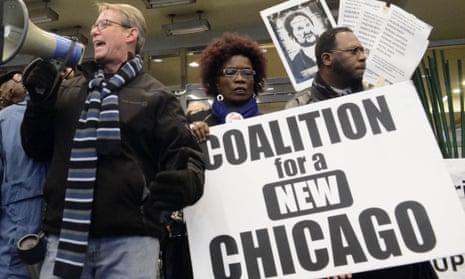Three Chicago police officers have been indicted on felony charges that they conspired to cover up the actions of a white police officer who shot and killed 17-year-old Laquan McDonald in October 2014.
In an indictment approved on Monday and announced on Tuesday, a Cook County grand jury alleges that one current and two former officers lied about the events of 20 October 2014 when officer Jason Van Dyke shot the black teenager 16 times.
“The co-conspirators created police reports in the critical early hours and days following the killing of Laquan McDonald that contained important false information in an attempt to prevent or shape any criminal investigation,” read to the indictment in which the three officers are charged with felony counts of obstruction of justice, official misconduct and conspiracy.
Patricia Brown Holmes, who was appointed special prosecutor last July to investigate officers at the scene and involved in the investigation of the shooting, issued a separate news release.
David March, Joseph Walsh and Thomas Gaffney, she said, “coordinated their activities to protect each other and other members of the Chicago police department by furnishing false information, making false police reports, failing to report or correct false information, ignoring contrary information or evidence, obstructing justice, failing to perform a mandatory duty, and performing acts each knew to be forbidden to perform…
“Further, the indictment makes clear that these defendants did more than merely obey an unofficial ‘code of silence’. It alleges that they lied about what occurred to prevent independent criminal investigators from learning the truth.”
The indictment also alleges that the conspiracy included an effort not to try to locate and interview three witnesses whose accounts of what happened were not consistent with the police version of events.
The officers, the indictment alleges, began to conspire almost immediately on 20 October 2014, “to conceal the true facts of the events surrounding the killing of Laquan McDonald” and “to shield their fellow officer from criminal investigation and prosecution”.
The indictment refers to that fellow officer only as “Individual A”.
Among other steps the officers took was to prepare police reports that falsely portrayed themselves as victims of McDonald, according to the indictment. It alleges the officers understood that, if video and other evidence became public, “it would inexorably lead to a thorough criminal investigation by an independent body and likely criminal charges”.
According to the Chicago police department, Walsh, who was Van Dyke’s partner, and March, a detective, have left the force. Gaffney remains on the force but, per department policy, he has been suspended because of the felony indictment, according to the department.
“The shooting of Laquan McDonald forever changed the Chicago police department and I am committed to implementing policies and training to prevent an incident like this from happening again,” Police Superintendent Eddie Johnson said in a statement.
Johnson did not comment specifically on the indictment. Kevin Graham, president of the officers’ union, said the union has not yet reviewed the indictment and declined to comment on an ongoing investigation.
In December, it was reported that Walsh and March were put on desk duty more than a year after McDonald was shot and well after the video was released that showed the accounts officers gave did not reflect what was captured on the now-famous dashboard camera.
Van Dyke was charged more than a year later with first-degree murder on the same day that the city – under orders from a judge – made public the dashboard camera video. He has pleaded not guilty.
If convicted, the men could face years in prison. The official misconduct charge alone carries a maximum penalty of five years in prison and a $25,000 fine.
